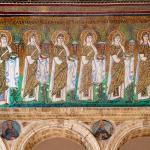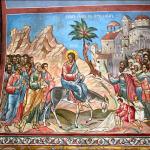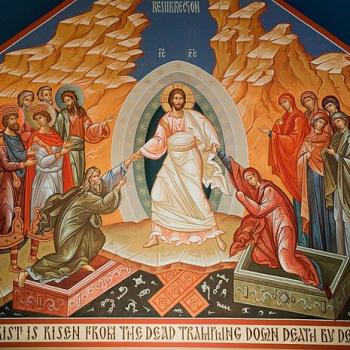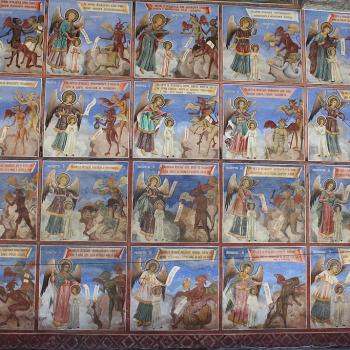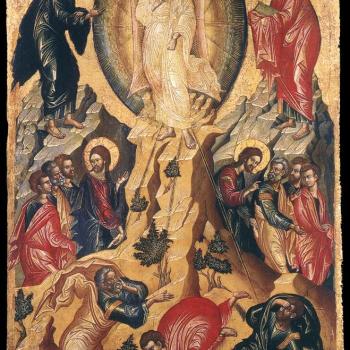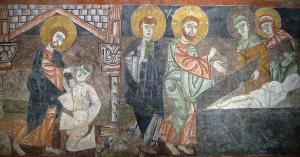
God created the world, and therefore created us, out of love. Through what the God-man did in his temporal ministry, we are shown the extant of God’s love for us. One of the ways he did this is through his friendship with Lazarus. When he went to see Lazarus in his death, Jesus wept (cf. Jn. 11:35). Even though Jesus knew Lazarus would partake of eternal glory, and that he would soon bring back Lazarus from the dead, he still wept at Lazarus’ death. His love for Lazarus, and therefore, God’s love for Lazarus, was revealed in his sorrow.
Death, as it has been touched by and contaminated by sin, had a sting to it which Jesus came to overturn, and this is what he would do through his own death and resurrection. Jesus knew that the sting of death would not have the final say. But that does not mean it did not, and would not continue to have an effect and cause people to suffer. It certainly did, and continues to do so, as our sin still affects the way we die and what we experience at the point of death. With Lazarus, Jesus confronted death and the way it affects us, showing us that he, and therefore God, is moved by it. His triumph over death requires us to encounter and embrace the tragedy associated with it, a tragedy which we all face, and if we ignore it, if we try to artificially defang the temporal consequences of death, we will not understand why Jesus, who would and did eternally defang it, could be moved by it when Lazarus died.
Jesus also loved Mary and Martha, Lazarus’ sisters (cf. Jn. 11:5), and he went to them to show them his love by going to them to comfort them and share with them the sorrow they felt with the loss of Lazarus. He shows us, once again, that God knows all our pains and sorrows, and has personally come to share them with us, to mourn with us when we mourn, and provide us the comfort which we need. Now, to be sure, what Jesus said to Martha seems to have been initially misunderstood by her:
When Martha heard that Jesus was coming, she went and met him, while Mary sat in the house. Martha said to Jesus, “Lord, if you had been here, my brother would not have died. And even now I know that whatever you ask from God, God will give you.” 23 Jesus said to her, “Your brother will rise again.” Martha said to him, “I know that he will rise again in the resurrection at the last day.” Jesus said to her, “I am the resurrection and the life; he who believes in me, though he die, yet shall he live, and whoever lives and believes in me shall never die. Do you believe this?” She said to him, “Yes, Lord; I believe that you are the Christ, the Son of God, he who is coming into the world” (Jn. 11:20-27 RSV).
Martha believed Jesus was trying to remind her that Lazarus will rise again at the end of the world, when all the saints will rise from the dead and be glorified. She agreed with him, and probably even felt some comfort in those words, similar to the way we all feel comfort when we are reminded how God will take care of and welcome our loved ones when they die. But Jesus said much more. He indicated that he is the one who will make it possible for the dead to rise up and share in God’s glory. In response, we are told that Martha gave a Christological confession, saying Jesus not only is the messiah, but the Son of God, acknowledging the truth of what he said. She was right to do so, even as Peter right to do so earlier in Jesus’ ministry, but we tend to forget that she offered such a confession, and that is because this is not the end of the story. Jesus came, not only to comfort her and Mary with words, but to give an extraordinary example of his power to give life by resuscitating Lazarus:
Then Jesus, deeply moved again, came to the tomb; it was a cave, and a stone lay upon it. Jesus said, “Take away the stone.” Martha, the sister of the dead man, said to him, “Lord, by this time there will be an odor, for he has been dead four days.” Jesus said to her, “Did I not tell you that if you would believe you would see the glory of God?” So they took away the stone. And Jesus lifted up his eyes and said, “Father, I thank thee that thou hast heard me. I knew that thou hearest me always, but I have said this on account of the people standing by, that they may believe that thou didst send me.”3 When he had said this, he cried with a loud voice, “Lazarus, come out.” The dead man came out, his hands and feet bound with bandages, and his face wrapped with a cloth. Jesus said to them, “Unbind him, and let him go” (Jn. 11:38-43 RSV).
Jesus loved Mary, Martha, and Lazarus, and in and through the love Jesus showed to them, we can read the way God loves all humanity, indeed all creation. He brought Lazarus back from the dead in anticipation of his entrance into Jerusalem and the passion which was to come. By doing so, he gave his followers hope so that when the dark times came, the time between his death and his resurrection, they would have something to remember and hold them together. Then, after his resurrection, they would be able to see it in a new light, to realize it was not just one temporal event, but also, it represented something transcendent, so that in and through the way Jesus engaged Martha, Mary, and Lazarus, he also engages all of us, trying to give us comfort and hope when we deal with death in our lives. In this way, we should see this as an example of God’s love, not just for Lazarus, but for all humanity, with Lazarus representing all of us in himself. Certainly, we should realize the story gives us a glimpse of how God looks at death, to see that God does not consider it insignificant, but rather, sees the tragedy for what it is and is moved by it.
Stay in touch! Like A Little Bit of Nothing on Facebook.
If you liked what you read, please consider sharing it with your friends and family!
N.B.: While I read comments to moderate them, I rarely respond to them. If I don’t respond to your comment directly, don’t assume I am unthankful for it. I appreciate it. But I want readers to feel free to ask questions, and hopefully, dialogue with each other. I have shared what I wanted to say, though some responses will get a brief reply by me, or, if I find it interesting and something I can engage fully, as the foundation for another post. I have had many posts inspired or improved upon thanks to my readers.


